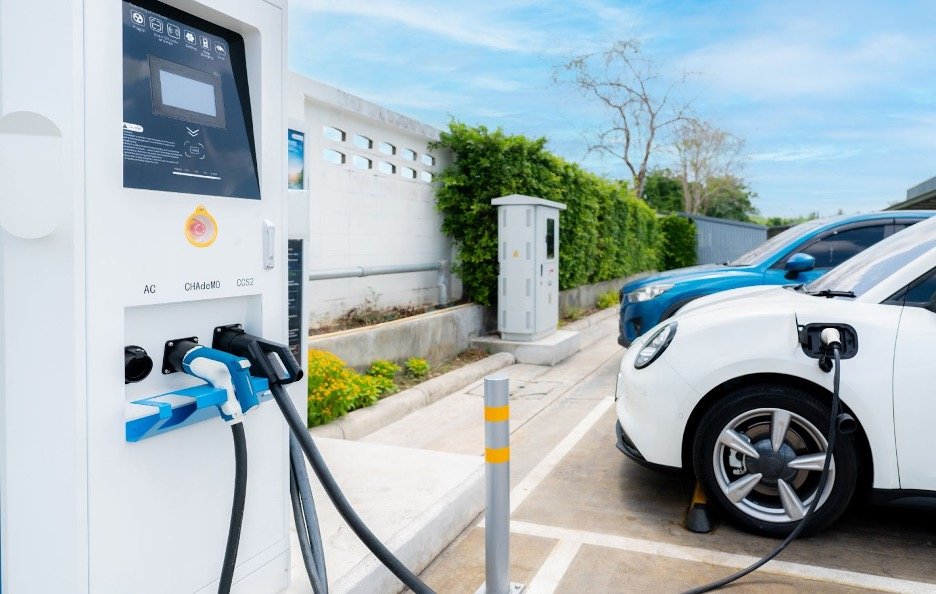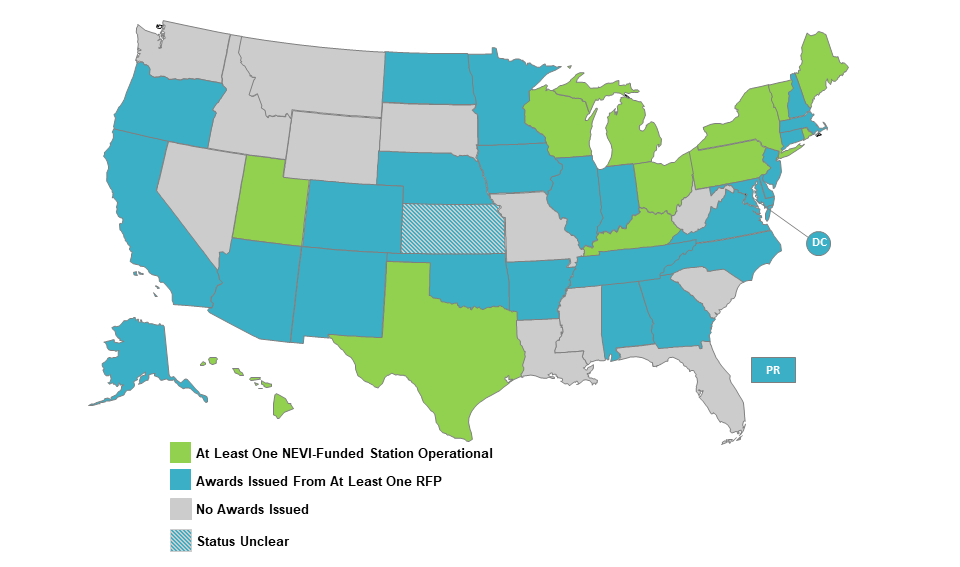NEVI Program Updates for 2025
The National Electric Vehicle Infrastructure Formula Program (NEVI) was approved in September 2022 with a $5 billion boost to help install fast chargers along interstate highways in all 50 states. The ambitious program aims to ensure that EV drivers have access to fast charging along the most frequently-traveled routes, which stretch for 75,000 miles along the nation’s Alternative Fuel Corridors (AFCs).
Under the NEVI program, all states (as well as the District of Columbia and Puerto Rico) have access to NEVI formula funding. Our previous blog details the criteria and funding that apply for eligible projects. The latest updates to the program are a huge step towards establishing nationwide standards for EV charging.
2025 NEVI Program Snapshot
Progress has been steady but initially slow. As of mid-2025, only 148 chargers are operational across 12 states, with 84% of funds unobligated due to cumbersome regulations.
Above image: Map of NEVI sites under contract (June 2025). Image credit: NC Clean Energy Technology Center
Latest NEVI Standards (2025 Updates)
New guidance was released in August 2025 that minimized administrative hurdles, such as extensive community engagement and non-statutory requirements for labor standards, environmental siting, and preferences for disadvantaged communities.
States now have more leeway in station spacing, fund allocation to public roads, and supporting owner-operated sites— all aimed at speeding up deployments.
Minimum standards and requirements apply in six key areas:
Installation, operation and maintenance. A minimum number of ports, connectors, payment methods and customer support services now apply. There are also minimum requirements for technicians installing and maintaining infrastructure, as well as better standardization and uniformity for certification, maintenance and customer data privacy.
Interoperability of EV charging infrastructure. The goal is to establish platforms that can connect and communicate from one state to another, both from charger to charger and network to network.
Traffic control devices and on-premise signs. These must now comply with FHWA regulations.
Data submission requirements to identify charger station use, reliability and cost information. Data must be submitted quarterly and annually for storage in a national database.
Network connectivity of EV charging structure. From charger to grid, new connectivity requirements are designed to allow for secure remote monitoring, diagnostics and control.
Standardize the communication to consumers of price and availability. Basic information must be available free of charge to third-party software developers. To prevent price gouging, pricing transparency must be protected when charging prices set by a third party.
An important requirement of the final rule is that all direct current fast charger (DCFC) ports must be capable of charging any combined charging system (CCS) vehicle using a CCS Type 1 connector. Some states are requiring a NACS connector option.
EV Connect’s NEVI-Compliant Charging Platform
EV Connect software is compliant on the security side and up to date with NEVI standards. The following criteria have to be met (among others):
EV charging stations must be non-proprietary
Must allow for open-access payment methods
Must be publicly available
Must be located on a designated Alternative Fuel Corridor (AFC) before state thresholds are met
Visit our NEVI-Compliant Charging Software page or Contact Us to learn more!
Frequently Asked Questions (FAQs)
What is the NEVI program?
The NEVI Formula Program is a $5 billion federal initiative to deploy 500,000 public EV chargers along designated corridors and public roads.
Is NEVI funding still available?
Yes, billions in NEVI funding remain available and are being accelerated following 2025 program revisions.
What can NEVI funds be used for?
Funds cover up to 80% of costs for acquiring, installing, operating, and maintaining public-access EV chargers meeting federal standards. NEVI funds can be used for “make-ready” work as well as EV charging hardware and software.
How to get NEVI funding?
Apply through your state’s Department of Transportation via their EV Infrastructure Deployment Plan, typically through competitive solicitations.
What are the additional state requirements?
States may add requirements like local permitting, workforce rules, or bidding preferences, but 2025 federal updates minimized non-statutory mandates. You can look for your state’s standards here.
What are the NEVI requirements for EV charging?
EV charging stations must be non-proprietary, they must allow for open-access payment methods, they must be publicly available, and in 2025 they can now extend beyond corridors to any public road or accessible location once Alternative Fuel Corridors are complete.


